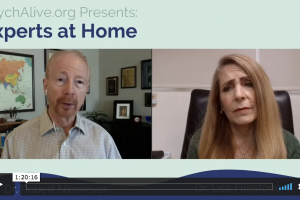The Gifts of Depression
The term depression tends to be slung about carelessly these days. We wake up in a funk, things didn’t go well at work today or we missed the most recent episode of Mad Men and we’re “depressed.” Technically, we’re not depressed. If we want to be nit-picky, we would clarify that we feel disappointed or lethargic, perhaps even frustrated or hopeless.
But for those times when we can legitimately say, “I am depressed,” the weight of our emotional state feels as if it might swallow us whole. We can’t see the light at the end of the tunnel and aren’t particularly interested in trying to move in that direction anyway. Some see depression as a punishment for some prior action, or an affliction from which to be cured as quickly as possible. And while medication has its place in alleviating some emotional pain, it often acts as a Band-Aid to quickly cover the pain, without really looking at the nature of the wound. This is when depression returns again and again, or simply stays with us, always just beneath the surface, threatening to leak out and expose the darkness that swirls within.
And yet there is a unique gift that only depression can offer. The catch is, we must spend time with it, get to know it, understand why it has chosen to show up at this time, and why it insists on sticking around. This is completely contrary to our instincts, when all we want is relief and escape from the abyss.
Philip Martin writes about depression’s gifts in his book, The Zen Path Through Depression, encouraging a somewhat paradoxical approach to this emotional state:
“Depression is in many ways like suffering from a broken heart. Indeed, when you slow down and begin to pay closer attention to the depression, the physical symptoms themselves may often center in the chest. Anxiety is the fast-beating heart. Hopelessness is the tired heart. Sadness and grief are the pained heart…
For many of us in these times, mind and thought are considered to be useful and valued, while heart and emotions are seen as obstacles. We don’t really know how to grieve and feel pain, but we definitely know how to think…
In the experience of depression, this mind we have depended on so much fails us. It is difficult to make simple decisions, to remember small matters. We feel slow and stupid. Depression in fact magnifies many aspects of our personality and our thought process. Our mind becomes preoccupied with judgments and comparisons…
Meditation helps with this, as it can foster real detachment from these thoughts and moods. We can then begin to disentangle ourselves from our pain. We can begin to move away from what Zen teachers call small mind. We begin to be less impressed with our thoughts.
As the grip of this small mind is lessened, the feelings and emotions of the heart are increased. For a person who has ignored the heart, its calling is persistent and unfamiliar. There are sadness and grief over the past, over all the fleeting moments behind us. We feel all the mistakes we have made, all the hurts we have caused. Depression can be a door into an exploration of our grief. This may be the first time we have faced our grief and honored it, rather than running from it…
Our hope is to practice compassion and kindness toward all. We must practice in this way toward ourselves and our own uncomfortable emotions as well…
In the strong and sometimes overwhelming sadness of depression lies the opportunity to face these difficult feelings with tenderness and compassion, rather than turning away from them.
Another new opportunity can be the experience of empathy. In the depths of depression, a woman I know found she could not watch television, because she wept at almost everything… Opening ourselves into the greater world, we may be feeling for the first time the grief of that world. In that feeling, we can find a compassion within ourselves that is as natural as breathing, a compassion that is always there….
The experience of grief and sadness in depression can be our hearts calling us to listen to suffering and impermanence in our lives…
The open heart sees that there is nothing to protect itself against, that safety is an illusion. In this seeing lies true fearlessness. For as we may find when faced with a physical danger, sometimes the safest place to be is as close as possible to what we fear.”
 About the Author
About the Author
Meredith Watkins, M.A. is a CA licensed Marriage and Family Therapist with years of experience working with women, teenagers, couples and families. She has worked in many settings, including an outpatient psychiatric clinic and a residential eating disorder treatment center. She is currently in private practice in Carlsbad, CA, specializing in individual therapy, Christian therapy, parenting, relationship, and women’s issues. Ultimately, her desire is to equip her clients with the tools they need to manage their own feelings and issues more effectively, creating space for joy and fulfilment in their relationships and lives. Learn more at www.meredithwatkins.net.
Other Posts by This Author:
Peace on Earth Begins with Peace of Heart
Making Peace with Our Bodies
More
5 Comments
Leave a Reply
You must be logged in to post a comment.










Thank you! This is very good advice.
Buchhandlung Dortmund Nice article! Funny and sad in one time! Hold on, I like ur blog!
Interesting article, we intend to share this on our Facebook page.
This is a great site in general!
Thank you Meredith. This speaks to me and my depression. Grateful for your share, cindy
Thank you very much. Much love